英汉互译5-omission
英译汉
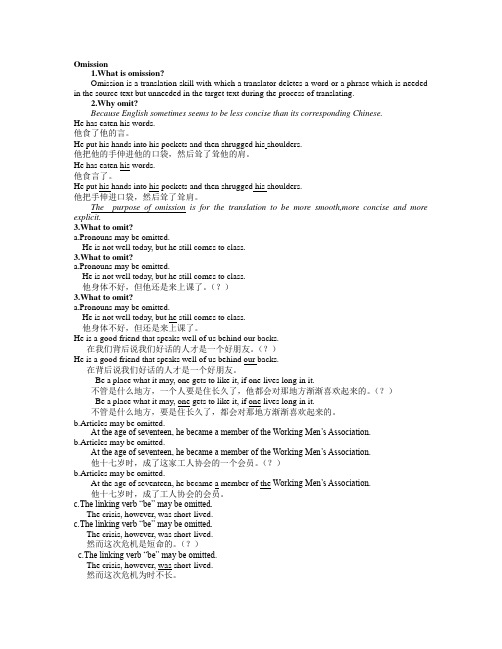
Omission1.What is omission?Omission is a translation skill with which a translator deletes a word or a phrase which is needed in the source text but unneeded in the target text during the process of translating.2.Why omit?Because English sometimes seems to be less concise than its corresponding Chinese.He has eaten his words.他食了他的言。
He put his hands into his pockets and then shrugged his shoulders.他把他的手伸进他的口袋,然后耸了耸他的肩。
He has eaten his words.他食言了。
He put his hands into his pockets and then shrugged his shoulders.他把手伸进口袋,然后耸了耸肩。
The purpose of omission is for the translation to be more smooth,more concise and more explicit.3.What to omit?a.Pronouns may be omitted.He is not well today, but he still comes to class.3.What to omit?a.Pronouns may be omitted.He is not well today, but he still comes to class.他身体不好,但他还是来上课了。
5 Omission
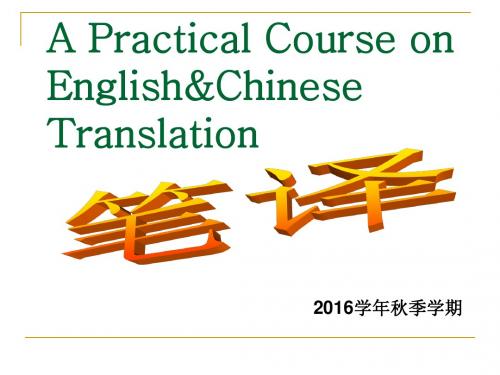
5.4 减去冠词
1. A teacher should have patience in his work. 当老师的应当有耐心。 2. The horse is a useful animal. 马是有益的动物。 3. The moon was slowly rising above the sea. 月亮慢慢从海上升起。 但在某些场合,冠词不能省略。如: 1.He left without saying a word. 他一句话不说就走了。 2. He said he was getting a dollar a mile. 他说他每开一英里就赚一元钱。
4). 减去并列连词
1. He looked gloomy and troubled. 他看上去有些忧愁不安。 2. Your son or your father or your wife or your teacher or your boss might be a good friend of yours. 你的儿子,你的父亲,你的妻子,你的老师,你的上司, 都可能是你的好友。 3. I was like that ship before my education began, only I was without compass or sounding-line, and had no way of knowing how near the harbor was. 我在开始受教育之前,就象这样一条船,只是没有罗盘, 没有测深绳,也无法知道离海港有多远。
4.3 减去人称代词
英语倾向于多用代词,特别是人称代词,凭借指代关
系传递逻辑信息。汉语则倾向于凭借复述传递逻辑信 息。因此,应注意在汉语译文中适当减去代词。
英汉互译Unit 5 Omission 省译法

16
2. Omitting the Meticulous Expression in the Original
Please expedite the L/C so that we may execute the order smoothly. 请加速开出信用证,以便顺利执行定单。 For further information regarding this system, reference may be made to U.S. Pat. No. 4374986. 欲知本系统详情,可参阅4374986号美国专利。 We take this opportunity to inform you that we are now in position to make prompt shipment of the merchandize. 兹奉告,该产品可即期装运。
他耸耸肩,摇摇头,两眼看天,一句话 也不说。
8
2. Omitting the Articles
The pen is mightier than the sword.
笔杆子胜过枪杆子。
Any substance is made of atoms whether it is a solid, a liquid, or a gas.
10
3. Omitting the Prepositions
The difference between the two machines consists in power.
这两台机器的差别在于功率不同。
Our aircraft mother ship was cruising near Wake Island on December 2 when we heard hostilities were to begin on December 7.
翻译讲义
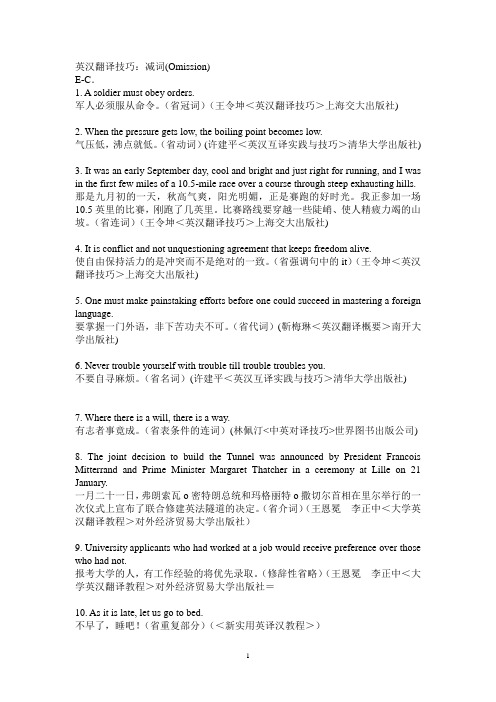
英汉翻译技巧:减词(Omission)E-C.1. A soldier must obey orders.军人必须服从命令。
(省冠词)(王令坤<英汉翻译技巧>上海交大出版社)2. When the pressure gets low, the boiling point becomes low.气压低,沸点就低。
(省动词)(许建平<英汉互译实践与技巧>清华大学出版社) 3. It was an early September day, cool and bright and just right for running, and I was in the first few miles of a 10.5-mile race over a course through steep exhausting hills.那是九月初的一天,秋高气爽,阳光明媚,正是赛跑的好时光。
我正参加一场10.5英里的比赛,刚跑了几英里。
比赛路线要穿越一些陡峭、使人精疲力竭的山坡。
(省连词)(王令坤<英汉翻译技巧>上海交大出版社)4. It is conflict and not unquestioning agreement that keeps freedom alive.使自由保持活力的是冲突而不是绝对的一致。
(省强调句中的it)(王令坤<英汉翻译技巧>上海交大出版社)5. One must make painstaking efforts before one could succeed in mastering a foreign language.要掌握一门外语,非下苦功夫不可。
(省代词)(靳梅琳<英汉翻译概要>南开大学出版社)6. Never trouble yourself with trouble till trouble troubles you.不要自寻麻烦。
(省名词)(许建平<英汉互译实践与技巧>清华大学出版社) 7. Where there is a will, there is a way.有志者事竟成。
翻译常用之八大技omission
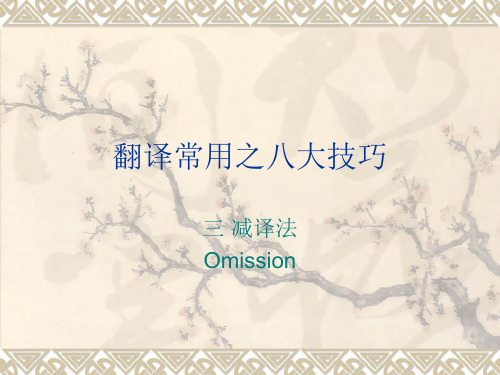
Attention: English is more likely to have complete structures, while Chinese is more likely to stress on certain parts, thus some indispensable English components become dispensable or even redundant in Chinese.
翻译常用之八大技巧
三 减译法 Omission
Shakespeare: Brevity is the soul of wit. 莎士比亚: 言贵简约。
* Structural Omission: Differences in sentence structures of the two languages. Eg. articles (esp. possessive pronoun物主代词), pronouns, conjunctions, prepositions, copula verbs 系动词 (be, seem, appear, etc.), antecedent先行词, particle引导词 (that, when, who, etc.) This is the book which I am looking for.中的book是先行词,which是引导词. He is Mr. Robertson who comes from England. 中的Mr. Robertson.是先行词,who 是引导词.
Chinese, paratactic(意合,并列的), no clear conjunctions to link sentences.
Because everyone uses language to talk, everyone thinks he can talk about language. (Johann Wolfgang von Goethe) 人人都用语言交谈,人人也就自认为能够谈论语言。(歌德语) All I am, or can be, I owe to my angel mother. (A. Lincoln) 我之所有,我之所能,都归功于我慈爱的母亲。
英汉互译八种技巧
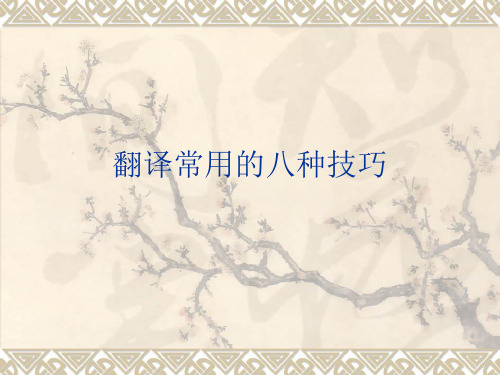
使译文合乎表达习惯,必须增加一些词语,这就 叫增译法. 增词义增加虚词为多,也可酌量增加实词。 英译汉时经常增加的词有结构词、数量词、 概念词、语气词等。 从增补的功能来看,可以分为结构增补、意 义增补和修辞增补。
I am looking forward to the holidays. 我们等待假日的到来。 Much of our morality is customary. 我们大部分的道德观念都有习惯性。 Reading makes a full man; conference a ready man; and writing an exact man. 读书使人充实,讨论使人机智,笔记使人精确。 Histories make men wise; poets witty; the mathematics subtle; natural philosophy deep; moral grave; logic and rhetoric able to contend. 读史使人明智,读诗使人灵秀,数学使人周密,科 学使人深刻,伦理使人庄重,逻辑修辞之学使人善 辩。
寻寻觅觅,冷冷清请,凄凄惨惨戚戚;乍暖还寒 时侯,最难将息。 (译文1)
Seek, seek; search, search; Cold, cold; bare, bare; Grief, grief; cruel, cruel grief. Now warm, then like the autumn cold again, How hard to calm the heart!
先生们尽管可以高呼和平,和平!但是依然没有和 平。
We
must enrich our cultural and material lives. 我们必须丰富我们的精神生活和物质生活。 (宾语前有多个定语时,要重复这个做宾语 的名词) 2)重复做表语的名词 This is a victorious conference that shows our unity. 这是一个胜利的大会,一个团结的大会。 (表语有多个修饰语时,重复做表语的名词)
chapter 5 omission

Omission is based on the differences between English and Chinese. For example, Chinese has no articles or infinitive markers. And pronouns, conjunctions, and prepositions are not used as frequently as those of English. So when we translate English sentences with articles and infinitive markers into Chinese, we often omit these articles or infinitive markers. What is considered necessary, indispensable and even a characteristic feature in one language may be deemed useless, superfluous or even a stumbling block in the other.
▪ But it’s the way I am, and try as I might, I haven’t been able to change it.
▪ 不过我就是这个脾气,虽然竭力想改,终究还 是改不了。
▪ He was thin and haggard and he looked miserable. ▪ 他消瘦而憔悴,看上去一副可怜相。
▪ 也许你的父母,妻儿,或者你最好的朋友都在盼 望你平安回家呢。
▪ 1.2.2 Omission of the subordinate conjunction
5 omission

1. You cannot build a ship, a bridge or a house if you don't know how to make a design or how to read it. 不会制图或者看不懂图纸,就不可能造船、 架桥或盖房子 2. 我们必须培养分析问题, 解决问题的能 力. We must cultivate the ability to analyze and solve problems
2. 表地点的介词(prep.referred to place) e.g. 1) Smoking is prohibited in public house. 公共场所不准吸烟 2) Now complaints are heard in all parts of that country. 该国各地目前怨声载道
6. If it rains tomorrow, I shall stay at home 7. Milk is sold by the pound 8. We love our motherland. 9. We cannot express ourselves in English. 10. Everything that a computer does is dependent on the person who uses it
2) If winter comes, can spring be far behind? 春天来了,冬天还会远吗?
3. 表示时间的连词 (conj.referred to time) e.g. When at last he stood upon the cliff, he turned to the little sister and looked upon her sorrowfully. 最后他站到了悬崖上,转过身来,忧郁地 望着妹妹
英汉互译UnitOmission省译法
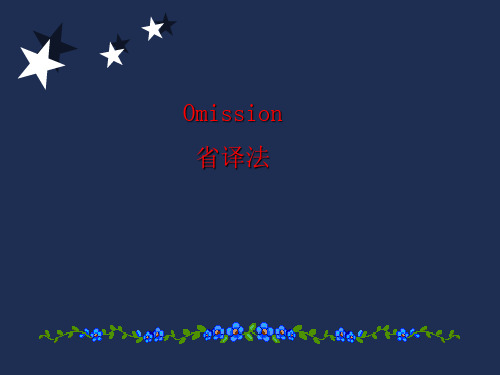
16
2. Omitting the Meticulous
Expression in the Original
Please expedite the L/C so that we may execute the order smoothly.
请加速开出信用证,以便顺利执行定单。 For further information regarding this
3
Motivation
Omission is based on the disparity in wording and the differences in syntax between English and Chinese. On the one hand, we have no articles or infinitive markers in Chinese. On the other hand, Pronouns, conjunctions, and prepositions are more frequently used in English than in Chinese. When translated into Chinese, many of them should be omitted so as to conform the rendering to the accustomed usage of Chinese expression.
Due to Syntactic Considerations
1. Omitting the Pronouns 2. Omitting the Articles 3. Omitting the Prepositions 4. Omitting the Conjunctions 5. Omitting the Verbs 6. Omitting the Impersonal Pronoun “It”
翻译常用的八种技巧

翻译常用的八种技巧1.增译法、增词法:amplification2.重译法、重复法:repetition3.省译法、减词法:omission4.词性转换法、词类转移法:conversion5.正说反译、反说正译法:negation6.语态变换法:the change of the voices7.分译法、分句法(OPP:合句法):division8.语序调整法、词序调整法(顺序法与逆序法)inversion增词法译文中添加一些原文没有的词句,表面上看似不忠实于原文,但仔细分析就会发现这些增加的词句所表达的意思并非无中生有,而是隐含在原文中的。
要知道,从一种语言文字向另一种语言文字转换,有时可以找到一种语言文字在另一种语言文字中的对等词,然而要想全部依赖对等词的转换来达到翻译的目的是几乎不可能的。
不同语言文字所持有的习惯决定了必须根据其中一种语言文字的习惯来适当地增词(或减词)达到语言交际的目的。
如果机械地按照字面意义直译,不仅不能表达原文的思想,精神与形象,而且还会使译文前后矛盾,闹出笑话。
例1 听到你平安的消息,非常高兴!译文: I was very glad on hearing that you were in safety!例2对不起,打扰一下!译文: Excuse me for interrupting you!(增补作宾语的代词you)例3 Histories make men wise; poems witty; the mathematics subtle; natural philosophy deep; moral grave; logic and rhetoric able to contend.译文:读史使人明智,读诗使人灵秀,数学使人周密,科学使人深刻,伦理使人庄重,逻辑修辞之学使人善辩。
(译文中添补了谓语和宾语:增词法;重译法)例4:We won’t retreat, we never have and never will.译文:我们不后退,我们从来没有后退过,我们将来也绝不后退。
英汉翻译4.Omission省略
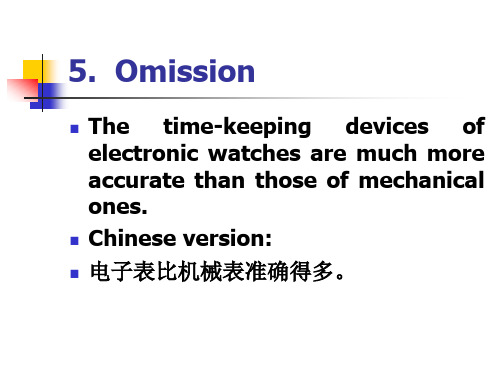
但某些情况下,冠词词不能省略: 但某些情况下,冠词词不能省略:
1)She stared at me without saying a ) word. 2) The taxi driver said that she was ) getting a pound a mile. 3)The two boys are of an age. ) 4)The traveler saw the bird fly away. )
I. Omission in English-Chinese Translation
1.Omission of the Pronoun 1)If you give him an inch, he will take a ) mile. 2) Everywhere you can find new types of ) men and objects in New China. 3)He was thin and haggard (憔悴的)and he 憔悴的) looked miserable. 4)She laid her hand lightly on his arm as if ) to thank him for it.
3.Omission of Meticulous . Description
花园里面是人间的乐园,有的是吃不了的 大米白面,穿不完的绫罗绸缎 绫罗绸缎,花不完的金 大米白面 绫罗绸缎 金 银财宝。 银财宝 The garden was a paradise on earth, with more food and clothes than could be consumed and more money than could be se preposition
09英汉翻译-3翻译技巧-减词译法
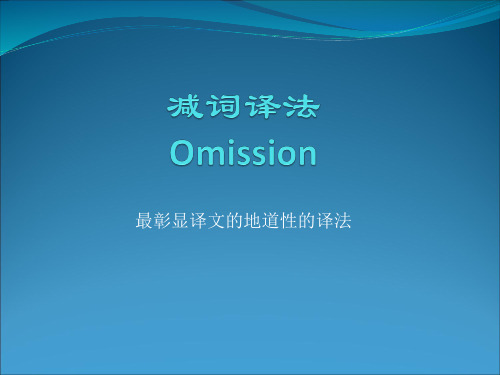
牛奶按磅计价。(牛奶是 论磅卖。)
不宜省略
当然,有些场合,冠词是不能省略的。比如不定冠词a 或an 表示数量 “一”时,定冠词the 表示“这”或“那”时,均不能省略。
He left without a word. 他一句话不说就走了。 He said he was getting a dollar a mile. 他说他每开一英里就赚一元钱。
学生们看完了随身携带的书,就打开盒饭 吃起来。
省略连词
汉语语言精炼,并列连词较少使用,其上下逻辑关系常常是暗含的, 由词语顺序来表示。 译为英语时,需要增补。证实了英语是形合语 言,汉语是意合语言的命题。相反,把英语译成汉语时,很多情况则 需省略连词。如:
一、 省去表示时间的连词
John rose gloomily as the train stopped, for he was thinking of his lovely girlfriend.
他把双手放进口袋,耸耸肩,走了。
二、省去作宾语的代词
I was at once interested in this finger play and tried to imitate it.
我马上对这种手指在手心里写字的游戏产生 了兴趣,接着就模仿起来。
I have received your letter and read it with delight.
dangerous animal. 马是有益的动物。/鳄鱼是危险的动物。
The direction of a force can be represented by an arrow. 力的方向可以用箭头表示。 The moon was slowly rising above the sea. 月亮慢慢从海上升起。
英语翻译与写作-Omission
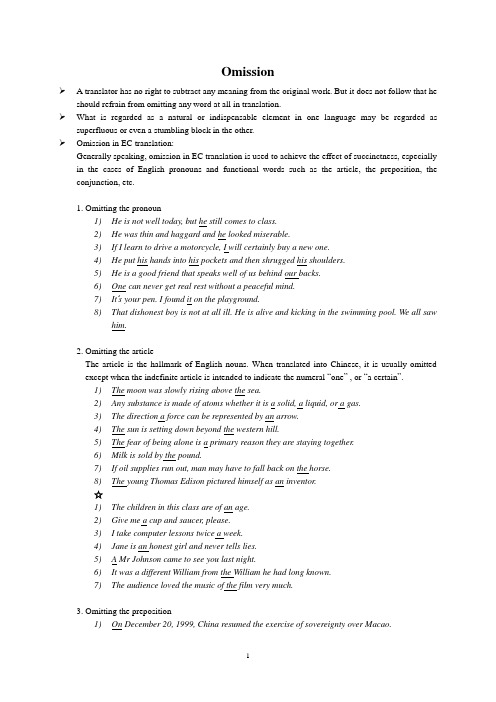
OmissionA translator has no right to subtract any meaning from the original work. But it does not follow that heshould refrain from omitting any word at all in translation.What is regarded as a natural or indispensable element in one language may be regarded as superfluous or even a stumbling block in the other.Omission in EC translation:Generally speaking, omission in EC translation is used to achieve the effect of succinctness, especially in the cases of English pronouns and functional words such as the article, the preposition, the conjunction, etc.1. Omitting the pronoun1)He is not well today, but he still comes to class.2)He was thin and haggard and he looked miserable.3)If I learn to drive a motorcycle, I will certainly buy a new one.4)He put his hands into his pockets and then shrugged his shoulders.5)He is a good friend that speaks well of us behind our backs.6)One can never get real rest without a peaceful mind.7)It’s your pen. I found it on the playground.8)That dishonest boy is not at all ill. He is alive and kicking in the swimming pool. We all sawhim.2. Omitting the articleThe article is the hallmark of English nouns. When translated into Chinese, it is usually omitted except when the indefinite article is intended to indicate the numeral “one” , or “a certain”.1)The moon was slowly rising above the sea.2)Any substance is made of atoms whether it is a solid, a liquid, or a gas.3)The direction a force can be represented by an arrow.4)The sun is setting down beyond the western hill.5)The fear of being alone is a primary reason they are staying together.6)Milk is sold by the pound.7)If oil supplies run out, man may have to fall back on the horse.8)The young Thomas Edison pictured himself as an inventor.☆1)The children in this class are of an age.2)Give me a cup and saucer, please.3)I take computer lessons twice a week.4)Jane is an honest girl and never tells lies.5) A Mr Johnson came to see you last night.6)It was a different William from the William he had long known.7)The audience loved the music of the film very much.3. Omitting the preposition1)On December 20, 1999, China resumed the exercise of sovereignty over Macao.2)The news has already spread along the streets and lanes.3)She soon fell asleep with the light still burning.4)Now complaints are heard in all parts of that country.5)Many new factories have been set up since liberation in their home town.4. Omitting the conjunctionConjunctions are not frequently used in Chinese. The connection between sentences are more often implied than directly conveyed through conjunctions. English is just the opposite in this respect.1)I came here in 1972 and I have lived here ever since.2)As he had been up since 4 a.m. he was no doubt now very tired.3)It may be a long time before an immigrant can fully get used to the customs and habits of thecountry to which he moves.4)If winter comes, can spring be far behind?5)You can describe this policy as rigid and inflexible, when, in fact, it has been extremelyflexible.6)Because it was getting dark, I had to say good-bye.5. Omitting the verb1)These suggestions are so valuable that we must put them into practice.2)He is in a stormy mood.3)Startled as he was, he did not lose his balance.6. Omitting the impersonal pronoun “it”This often occurs when “it”stands for time, weather, distance, or formal subject / object of a sentence.1)Outside it was pitch dark and it was raining cats and dogs.2)How far is it from the school to the zoo?3)It was very noisy outside at the moment.4)It was with some difficulty that he found the way to his house.5)It is only shallow people who judge by appearances. 只有浅薄的人才会以貌取人。
翻译常用之八大技omission

要点二
正反表达(Positive and Negative …
正反表达是指在翻译时,根据目标语言的表达习惯和读者 的理解需求,将原文中的肯定表达转换为否定表达或将否 定表达转换为肯定表达。正反表达常用于处理英语中的双 重否定和汉语中的肯定与否定对等方面。
02
省略技巧
省略主语
当主语是显而易见的或已经在上下文中明确时, 可以省略主语。
07
重复技巧
重复名词
为了明确或强调某个概念或事物,可 以重复使用该名词,例如在科技文本 中,为了强调某个设备或技术的重要 性,可以多次提及该名词。
在文学作品中,重复名词也可以起到 修辞的效果,例如反复使用某个象征 性的物品或地名,来强化主题或情感 。
重复动词
重复动词可以用于表示连续的动作或行为,例如在描述一个过程或事件时,可以使用相同的动词进行 多次描述,以加强读者的印象。
分句性替代
01
使用从句替代
英语中的从句可以替代主句或分句中的某些成分,使表达更加紧凑和准
确。
02
使用独立主格结构替代
独立主格结构是一种非谓语动词的特殊形式,可以用来替代某些从句或
分句,使译文更加简洁和流畅。
03
使用并列句替代
并列句是由并列连词连接的两个或两个以上的简单句。在翻译中,可以
使用并列句来替代某些复杂句或复合句,使译文更加清晰和易于理解。
增加动词还可以使译文更加生动形象,增强表达力。例 如,在翻译“She walked into the room with a smile on her face.”这句话时,如果只译为“她走进房间, 脸上带着微笑。”,可能会显得比较平淡。而增加动词 “洋溢”,将其译为“她走进房间,脸上洋溢着微 笑。”,则可以使译文更加生动形象。
实用英语翻译5 Amplification & Omission
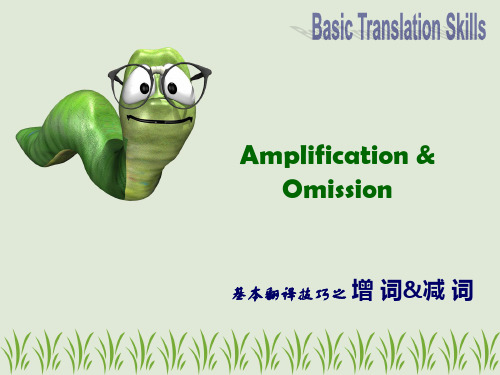
主语
• 汉语中有许多没有主语的句子,英语则一般需要主 语; 另外汉语中很多名词前都没有代词,需要增补。
• 大作收到,十分高兴。 • I am very glad to have received your writing. • 没有调查就没有发言权。 • He who makes no investigation and study has no
• It’s better to be wise by the defeat of others than to be wise by the defeat of your own.
• 从别人的失败中吸取教训比从自己的失败中吸取教 训更好。
• The fox may grow old, but never good. • 狐狸会变老,永远难变好。 • 江山易改本性难移。
• 虚心使人进步,骄傲使人落后。 • Modesty helps one go forward, whereas conceit
makes one lag behind. • 姐姐在等我,我得走了。 • My sister is expecting me, so I must be off now. • 他不来我不走。 • I shall not go until he comes.
Amplification & Omission
基本翻译技巧之 增 词&减 词
Amplification Omission Translation of Letters Exercises
Amplification
增词法
How to translate the “wash”?
1) Mary washes before meals. 2) Mary washes after getting up. 3) Mary washes for a living. 4) Mary washes in a restaurant.
Omission减词
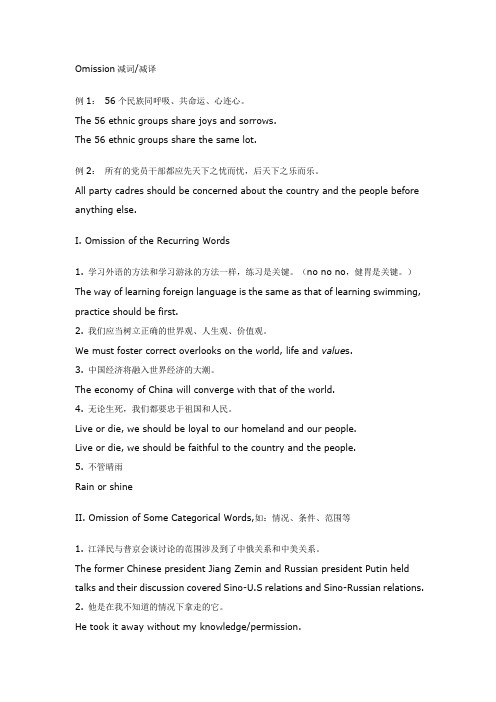
Omission减词/减译例1:56个民族同呼吸、共命运、心连心。
The 56 ethnic groups share joys and sorrows.The 56 ethnic groups share the same lot.例2:所有的党员干部都应先天下之忧而忧,后天下之乐而乐。
All party cadres should be concerned about the country and the people before anything else.I. Omission of the Recurring Words1. 学习外语的方法和学习游泳的方法一样,练习是关键。
(no no no,健胃是关键。
)The way of learning foreign language is the same as that of learning swimming, practice should be first.2. 我们应当树立正确的世界观、人生观、价值观。
We must foster correct overlooks on the world, life and value s.3. 中国经济将融入世界经济的大潮。
The economy of China will converge with that of the world.4. 无论生死,我们都要忠于祖国和人民。
Live or die, we should be loyal to our homeland and our people.Live or die, we should be faithful to the country and the people.5. 不管晴雨Rain or shineII. Omission of Some Categorical Words,如:情况、条件、范围等1. 江泽民与普京会谈讨论的范围涉及到了中俄关系和中美关系。
英汉翻译之省略法

Ⅰ. Omission in English-Chinese Translation 省略法在英汉翻译中的运用
1、Omitting the Pronoun 省略代词 You will be staying in this hotel during your visit in Beijing. 你在北京访问期间ห้องสมุดไป่ตู้住在这家饭店里。 I hope you will enjoy your stay here. 希望您在这儿过得愉快。 We are pleased to have received your invitation to the symposium on internet. 非常高兴收到你寄来的参加互联网会议的邀请。 We live and learn. 活到老,学到老。
There was expected to be more discussion.
希望有更多的讨论。 There are not any perfect conductors. 没有绝对的导体。
Warm-up Activity
3)译成“四字句”或并列句。 There is no down. 平安无事。 There is not a moment to be lost. 分秒必争。 There is no telling what will happen. 未来的事无可奉告。 There are friends and friends. 朋友有好的,也有坏的。
Warm-up Activity
英译汉时,我们通常会用“当……的时候”来 翻译以when引导的状语从句。但在汉语中这个 结构用得并不普遍,尤其是在口语中。没有人 会说: 当我吃饭的时候,他进来了。 (He came in when I was having dinner.) 一般我们会说: 他进来那会儿我正在吃饭。或者, 我正吃饭,他进来了。
Unit 5 Omission【范本模板】

英汉互译讲义四翻译技巧第四节省略法Omission所谓省略法,就是把原文中需要而译文中不需要的单词、词组等在翻译过程中加以省略。
省略法是出于语法结构、习惯表达法或者修辞的需要,在能充分表达原意的基础之上,使译文更加通顺流畅、言简意赅.一、语法需要英语中大多数词是因语法需要而存在,比如英语中冠词使用较广而汉语中却没有冠词,因此在译文中将其省略不译。
再如代词、介词和连接词在英语中也广为使用,而汉语往往可以借助语序来表达逻辑关系,因此这几种词也用的较少。
1.1 省略冠词※ A doctor should have patience in his work.医生对待工作应当有耐心。
※The horse is a useful animal。
马是有用的动物.※It was out of the question to fly to the moon in the past.在过去,飞往月球是绝对不可能的。
在有些情况下,冠词不可以省略。
例如:※He left without saying a word.他一句话不说就走了.※He said he was getting a dollar a mile.他说他开车每一英里赚一美元。
1.2 省略代词英语通常每句话都有主语,人称代词往往多次出现。
而根据汉语习惯,前句出现一个主句,后句如果仍然是用同一个主语,就不必重复出现,常可省略.※He was thin and haggard and he looked miserable。
他消瘦而憔悴,看上去一幅可怜相。
※He put his hands into pockets and then shrugged his shoulders。
他将双手放进衣袋,然后耸了耸肩。
※Please let us know the detailed information on your market.请告知(我方)贵方市场详情。
※We live and learn。
- 1、下载文档前请自行甄别文档内容的完整性,平台不提供额外的编辑、内容补充、找答案等附加服务。
- 2、"仅部分预览"的文档,不可在线预览部分如存在完整性等问题,可反馈申请退款(可完整预览的文档不适用该条件!)。
- 3、如文档侵犯您的权益,请联系客服反馈,我们会尽快为您处理(人工客服工作时间:9:00-18:30)。
Unit 5 OmissionOmission is a technique opposite to amplification. True, a translator has no right to subtract any meaning from the original work. But it does not follow that he should refrain from omitting any words at all in translation. In fact, one of the marked differences in syntax between English and Chinese is the disparity in wording. What is regarded as a natural or indispensable element in one language may be regarded as superfluous or even “a stumbling block” in the other.Ⅰ. Omission in English-Chinese TranslationGenerally speaking, omission in English-Chinese translation is used to achieve the effect of succinctness, especially in the cases of English pronouns and functional words such as the article, the preposition, the conjunction, etc.1.Omitting the PronounPronouns are more frequently used in English than in Chinese. Therefore, when translated into Chinese, many English pronouns may be omitted so as to conform the rendering to the accustomed usage of Chinese expression.·He put his hands into his pockets and then shrugged his shoulders.他将双手放进口袋,然后耸了耸肩。
·For two weeks, he had been studying the house, looking at its rooms, its electric wiring, its path and its garden.两周以来,他一直注意观察房子的情况,查看各个房间,留心电线的走向,通道和花园的布局。
·They went in to dinner. It was excellent, and the wine was good. Its influence presently had its effect on them. They talked not only without acrimony, but even with friendliness.他们进入餐室用餐。
美酒佳肴,顿受感染,言谈间不但没有恶言恶语,甚至还充满友好之情。
2. Omitting the ArticleThe article is the hallmark of English nouns. When translated into Chinese, it is usually omitted except when the indefinite article is intended to indicate the numeral “one”, or “a certain”.·The moon was slowly rising above the sea. 月亮慢慢从海上升起。
·Any substance is made up of atoms whether it is a solid, a liquid, or a gas.任何物质,不论是固体,液体或气体,都由原子组成。
·The direction of a force can be represented by an arrow. 力的方向可以用箭头表示。
3.Omitting the PrepositionChinese is characterized by its succinctness and the preposition appears less frequently in Chinese than in English, and therefore omission of prepositions is a common practice in English-Chinese translation.·Smoking is prohibited in public places. 公共场所不许吸烟。
·The difference between the two machines consists in power. 这两台机器的差别在于功率不通。
·Hydrogen is the lightest element with an atomic weight of 1.008.氢是最轻的元素,原子量为1.008.4. Omitting the ConjunctionChinese is considered an analytic language and many conjunctions that are indispensable in English may seem redundant in Chinese.·He looked gloomy and trouble. 他看上去有些忧愁不安。
·If I had known it, I would not have joined in. 早知如此,我就不参加了。
·Like charges repel each other while opposite charges attract.同性电荷相斥,异性电荷相吸。
5. Omitting the VerbAs Chinese is a language of parataxis (意合连结), its grammar is not so strict as that of English, and predicative verbs in Chinese sometimes may also be omitted.·When the pressure gets low, the boiling point becomes low. 气压低,沸点就低。
·Solids expand and contract as liquids and gases do.如同液体和气体一样,固体也能膨胀和收缩。
·For this reason television signals have a short range. 因此,电视信号的传播距离很短。
6. Omitting the Impersonal Pronoun “it”This often occurs when “it” stands for time, weather, distance, or formal subject/object of a sentence.·Outside it was pitch-dark and it was raining cats and dogs. 外面一团漆黑,大雨倾盆。
·This formula makes it easy to determine the wavelength of sounds.这一公式使得测定声音的波长十分简单。
·It was not until the middle of the 19th century that the blast furnace came into use.直到19世纪中叶,高炉才开始使用。
Ⅱ. Omission in Chinese-English TranslationOmission in Chinese-English translation is usually used to avoid unnecessary repetition. It is generally employed in three circumstances: 1. Redundant words in original Chinese, such as unnecessary repetition and wordy expressions; 2. the original meaning that has already been implied in the context of the English version; and 3. the original meaning obviously shown in the English version without further elaboration.1.Omitting Redundant Words▪质子带正电,电子带负电,而中子既不带正电,也不带负电。
A proton has a positive charge and an electron a negative charge, but a neutron has neither.▪我已经提前完成了交给我的工作,他也提前完成了交给他的工作。
I have fulfilled my assigned work ahead of schedule, so has he.▪我们说,长征是历史记录上的第一次,长征是宣言书,长征是宣传队,长征是播种机。
We answer that the Long March is the first of its kind in the annals of history that is a manifesto, a propaganda force, a seeding-machine.▪匪军所至,杀戮人民,奸淫妇女,焚毁村庄,掠夺财物,无所不用其极。
